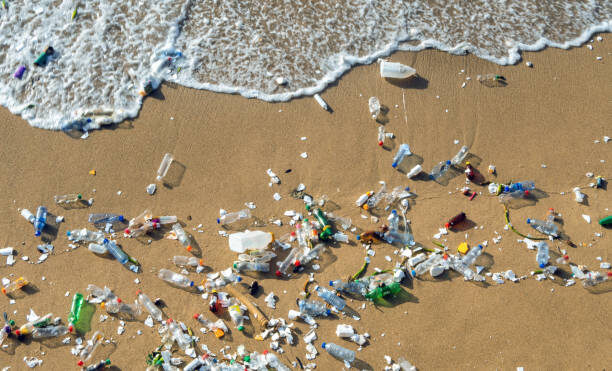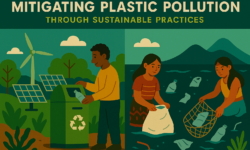
Plastic production has skyrocketed over the last 70 years. In 1950, the world produced just two million tonnes of plastic. Fast forward to today, and production has surpassed 450 million tonnes annually, according to the United Nations Environment Programme. While plastics have brought immense value to human lives through their versatility, cost-effectiveness, and utility in industries ranging from medical to agriculture, their environmental consequences are severe and far-reaching. When we look at these statistics that are very alarming that over 1 million plastic bottles are purchased worldwide every minute. While a single plastic bag takes 20-1,000 years to decompose.
The Problem at Hand
Plastics are synthetic, organic polymers primarily derived from fossil fuels like petroleum and natural gas. From construction materials to food packaging, plastics have become indispensable. However, the other side of this convenience emerges when plastic waste is mismanaged failing to be recycled and disposed of in sealed landfills.
This vast pollution impacts all ecosystems, including land, freshwater, and marine, and is a major cause of biodiversity loss and ecological degradation. In marine environments, plastics mainly come from land runoff, discarded fishing gear, and ship waste. Over time, macroplastics break down into microplastics (less than 5mm) and nanoplastics (less than 100nm), which can infiltrate food chains and even enter human bodies.
Plastic trash has the most evident effects on wildlife, including ingestion, asphyxia, and entanglement. Birds, whales, fish, and turtles mistake indigestible plastic garbage for food and starve to death when their stomachs grow overfilled. It also causes internal and external damage, limiting the ability to swim and fly. Plastic pollution affects domestic farm animals as well. Floating plastics transmit invasive alien species, which are one of the primary drivers of biodiversity loss and extinction. In metropolitan areas with poorly managed waste, cows and other cattle often ingest plastic while foraging in open dumps or garbage piles. Consuming plastic bags and wrappers can block their digestive tracts, leading to severe health issues like indigestion, internal injuries, and malnutrition. Over time, the accumulation of plastics in their stomachs causes reduced appetite, weakness, and even death. Toxic chemicals from plastics can also contaminate their milk, posing risks to human health. Proper waste management and awareness are essential to protect cattle and prevent such harmful consequences.
Studies have detected microplastics in human blood, placentas, and everyday consumables like tap water, beer, and salt. Many chemicals used in plastic production are carcinogenic and can cause developmental, reproductive, and immune disorders. The impact disproportionately burdens developing nations, islands, indigenous communities, and marginalized groups that lack infrastructure to manage plastic waste effectively.
Economic and Climate Impacts
Plastic pollution also brings economic setbacks, particularly in sectors like fisheries, agriculture, tourism, and water safety. Countries reliant on marine ecosystems for their livelihood face income declines as polluted waters disrupt the ecosystem. Plastics contribute to climate change at large extent by releasing greenhouse gases like carbon dioxide, methane, and dioxins.
India’s Efforts to Combat Plastic Pollution
According to Down to Earth, in 2024, India is projected to be among the top four contributors of microplastics released into waterbodies. As one of the world’s largest consumers of plastic, India faces significant challenges but has also taken notable steps to address the crisis.
Plastic Waste Management Rules, 2016: Introduced by the Ministry of Environment, Forest, and Climate Change (MoEFCC), these rules aimed to regulate the production, sale, and disposal of plastics while targeting adverse environmental impacts. The rules applied to waste generators, local bodies, manufacturers, importers, and producers.
Plastic Waste Management (Amendment) Rules, 2024: The 2024 amendment reflects India’s increased focus on addressing modern plastic-related concerns, such as microplastics and biodegradable plastics. Key highlights include:
Defining biodegradable plastics and microplastics for clarity and regulatory focus.
Expanding the definition of importers to include a broader range of plastic-related materials.
Including intermediate materials under the principle of Extended Producer Responsibility (EPR), holding producers accountable for post-consumer waste management.
Mandating a CPCB (Central Pollution Control Board) certificate for marketing biodegradable plastics.
These legislative measures can help to achieve sustainable development goals (SDGs) and combating climate change.
What Must Be Done?
To address the crisis effectively, according to IUCN (International Union for Conservation of Nature) a global plastics treaty is critical, as plastic pollution is transboundary in nature. This treaty must focus on ambitious targets such as:
Reducing plastic production and phasing out harmful subsidies.
Eliminating products and chemicals of concern.
Adopting strong national plans, compliance mechanisms, and measurable, sustainable objectives.
Promoting circular economy solutions like reuse, refill, and eco-friendly product design.
National efforts must converge with commitments made under international frameworks, including the Kunming-Montreal Global Biodiversity Framework (GBF), the Paris Agreement, and the Ramsar Convention on Wetlands.
Towards a Sustainable Future
The plastic crisis requires collective, science-based, and inclusive solutions. Investment in infrastructure, education, and indigenous knowledge systems, combined with innovative technologies, will be key in tackling the plastic menace. India’s evolving legislation is a positive step forward, but the road ahead demands rigorous enforcement, public participation, and international cooperation.
As we strive to safeguard ecosystems and human health, it is imperative to recognize plastic as not just an environmental challenge but a societal and economic one that needs global attention. Addressing this crisis today will shape the future we leave for generations to come.
The 5 R’s: A Path to Plastic Reduction
Reduce
The first step is avoiding single-use plastics whenever possible. Choose items with minimal or no packaging, and prioritize durable, long-lasting alternatives. For example, buying fresh produce without plastic wrapping can significantly cut down your plastic footprint.
Reuse
Embrace reusable bags, bottles, and containers in your daily life. For instance, carry a reusable coffee mug for your morning brew or use glass jars to store snacks. Even single-use plastic containers can be repurposed into planters, organizers, or craft supplies.
Recycle
Properly dispose of plastic waste by participating in recycling programs.
Support
Businesses that promote sustainability need our backing. Shop from eco-friendly brands, encourage restaurants who gives plastic free packaging and encourage your community to adopt sustainable practices.
Spread Awareness
Change starts with awareness. Educate your friends, family, and colleagues on the importance of reducing plastic waste. Use social media, community events, or even casual conversations to highlight actionable solutions.
Actions to Minimize Single-Use Plastics
Avoid Disposable Cutlery
Bring your own cutlery or say “no” to plastic spoons and forks when ordering takeout. opt for bamboo or metal alternatives.
Ditch the Cling Film
Replace cling wrap with reusable beeswax wraps, silicone lids, or glass containers with lids for food storage.
Cook More
Homemade meals reduce the need for packaged food, which is often encased in layers of plastic. Cooking at home also lets you control waste and prioritize fresh, local produce.
Purchase Second-hand Items
Shop second-hand for clothes, furniture, and household goods to minimize plastic packaging from new products.
Buy in Bulk
Purchasing in bulk reduces the need for individually packaged goods. Bring your own containers to refill grains, spices, and oils from bulk stores. Look for products with eco-friendly packaging.
Get Milk Delivered
Many local dairies now offer milk in glass bottles that are reusable and returnable. This old-school practice cuts down on plastic bottles and cartons.
The Power of Small Changes
While these steps may seem small, collectively they create a significant impact. Reducing single-use plastics helps protect wildlife, improve ecosystems, and lessen the burden of waste management on communities. Every reusable bag or bottle you use sets an example for others and contributes to a cleaner, healthier future for our planet.
Let us take the first step one choice, one action at a time. Together, we can reduce plastic pollution and move toward a sustainable tomorrow.






